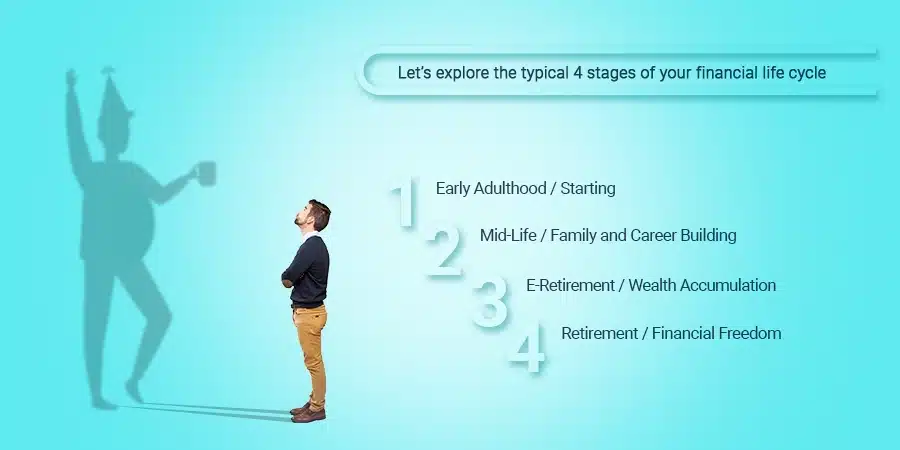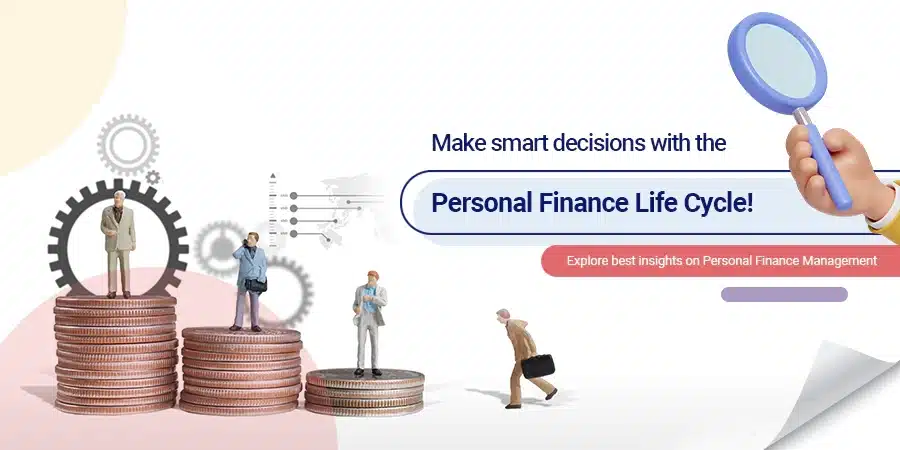Personal Finance Management is Simple
Managing personal finances can be intimidating for many, but for some, it just reflects their personality and behavior.
It all starts when we receive our monthly allowances, and we learn how to spend thriftily and save for things we want, like a dream bike.
As we grow older, we begin to manage our income and expenses. Personal finance lifecycle management can be divided into three categories: wealth accumulation, wealth preservation, and wealth management.
Financial planning and wealth management are not one-time tasks but rather a lifelong process.
It can be broken down into different stages, such as teenage years, young adulthood, starting a family, planning to retire, and successful retirement.
Start Early, Be Disciplined
During the teenage years, we should learn to budget and save.
Young adulthood can be challenging due to student loans and rent, but it’s also an exciting time as we receive our first paychecks.
Then, starting a family brings bigger expenses, but it’s also an exciting opportunity to work together and invest in the future.
Pre-retirement is a calmer time, focusing on securing nest eggs and downsizing. Finally, retirement arrives, a time of financial freedom where smart choices lead to a serene life.
Remember, at every stage, small steps today build a life of financial well-being tomorrow.

Let’s Get There, Step by Step
The personal finance life cycle refers to the various stages and phases that individuals go through in managing their finances throughout their lives.
It encompasses the financial decisions, challenges, and milestones that people encounter from the beginning of their adult life through retirement.
Here's a brief overview of the typical 4 stages of your personal finance life cycle:

Early Adulthood/Starting:
Focus on establishing a career, managing student loans and debt, creating a budget, and learning financial basics.
Mid-Life/Family and Career Building:
Homeownership and mortgage management, raising a family, including education savings for children, and career advancement and income growth.
Pre-Retirement/Wealth Accumulation:
Continued investment in assets (e.g., stocks, real estate), retirement savings and planning, reviewing insurance coverage, and estate planning.
Retirement/Financial Freedom:
The transition from saving to spending accumulated wealth, managing retirement accounts and income streams, estate planning, and considerations for legacy.
Throughout this life cycle, individuals face different financial challenges and opportunities.
They may need to adapt their investment strategies, insurance coverage, and budgeting approaches to align with their changing goals and circumstances.
Adapting to each phase is important – it’s like fine-tuning your GPS to reflect changing priorities.
Effective financial planning during each stage can ensure your long-term financial well-being and bring a sense of security.
Examining Susan's Expert Financial Management Throughout the Journey
Let’s take a closer look at the financial journey of Susan, to explore the various stages of personal finance and the decisions she makes along the way.

Early Career and Financial Foundation:
Susan started her finance planning right with her first pay cheque. In the initial phase of her career, she builds a strong financial foundation.
She regularly contributed towards her emergency fund to cover unforeseen expenses.
She also started planning for retirement by contributing to her employer-sponsored retirement plan and setting achievable short-term financial goals.
By budgeting wisely and living below her means, Susan laid the groundwork for future financial success.
Education and Skill Development:
Learn, unlearn, and re-learn, this is today a proven way to enhance your career and open doors to a wide array of opportunities.
Susan invested in her education and skill development to enhance her earning potential.
Whether through formal education or professional certifications, she understood the importance of staying competitive in her field.
This investment paid off in the long run, as Susan got access to better job opportunities and higher income potential.

Marriage and Family Planning:
Marriage and family are game changers in everyone’s life. A smooth married life is laid on the foundation of correct financial planning.
Once you have kids, you have to provide for their living and education expenses at least till 18 years of age. As Susan progressed through her career, she decided to start a family.
She discussed her and her partner’s finances thoroughly. Both of them understood each other’s income, expenses, life goals, hobbies, and passions.
This transition required her to reassess her financial goals and make adjustments to accommodate the needs of her growing family.
Susan explored life insurance options, updated her will, and invested in college savings plans for her children.
Homeownership and Real Estate:
Buying a home is a major milestone in our lives and reaching it requires a well-curated financial plan.
With a now stable income and a growing family, Susan bought her own house.
She carefully evaluated her financial capacity, explored mortgage options, and considered long-term affordability.
By making a strategic home purchase, Susan not only provided stability for her family but also created a potential asset for the future.
Mid-Career Focus on Wealth Building:
With a house in place and regular installments towards loans being streamlined, Susan looks for enhanced career and earning opportunities.
In the mid-career phase, Susan shifts her focus towards wealth building.
She explored investment opportunities such as stocks, bonds, and retirement accounts.
Diversifying her investment portfolio helped Susan manage risk while seeking long-term growth.
Additionally, she maximized her contributions to retirement accounts to capitalize on compound interest.
Planning for Education Expenses:
Susan had thoughtfully planned out the funds that her kids would require for higher education.
She had streamlined her savings into different pockets like children’s education, and retirement.
As Susan’s children approached college age, she proactively planned for their education expenses.
Utilizing education savings accounts and exploring scholarship opportunities. Susan ensured that her children had the financial support they needed for higher education without compromising her retirement savings.
Pre-Retirement Financial Planning:
Approaching retirement, Susan assessed her retirement savings and made strategic decisions about when to retire and how to transition into a fixed-income lifestyle.
She considered factors such as Social Security benefits, healthcare costs, and potential downsizing of her living arrangements.
Retirement and Legacy Planning:
In retirement her retirement years, Susan enjoys the fruits of her financial discipline followed all through her life.
Since she had started savings for retirement at an early age, compounding returns on her investments have now given her a substantial sum.
She continues to manage her investments wisely and considers ways to pass on her wealth to the next generation through estate planning.
She is thoughtful of the monthly allowances she is taking from her corpus and also simultaneously looking to enjoy her heydays.
Susan’s retirement goals are not just about living and relaxing. It also makes it feasible to pursue her passions and travels. She is also leaving a legacy for her loved ones.
So What Did We Learn from Susan’s Story?
Each phase of our life demands a different approach and financial tools. Your priorities change and so does your income generation and expenses pattern.
It is like adjusting your GPS to reflect changing priorities. The financial life cycle is about adapting, learning, and enjoying the unique experiences each stage brings.
Now you’re not just financially secure but also relishing the journey along the way.
Parting Thoughts
Throughout life, money comes and goes, priorities change, and challenges can knock at any hour.
The key to financial well-being lies in maintaining a mindful approach, adjusting your methods as needed, and always striving for progress.
No matter your current stage, remember that your financial journey can always begin. With ongoing learning, proactive planning, and smart decisions, you can build a financial future filled with financial security and financial independence.
Now that you’ve explored the stages of the personal finance life cycle, use this newfound knowledge to start thinking and plan for your next steps.
Seek professional financial advisor advice, talk about it with key people in your life, and discuss it with your friends and colleagues. This will all just help you get there smartly!









